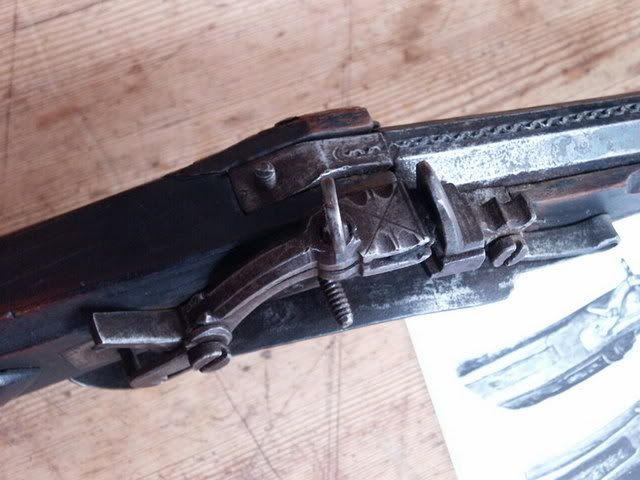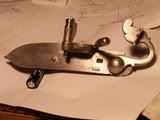-
Friends, our 2nd Amendment rights are always under attack and the NRA has been a constant for decades in helping fight that fight.
We have partnered with the NRA to offer you a discount on membership and Muzzleloading Forum gets a small percentage too of each membership, so you are supporting both the NRA and us.
Use this link to sign up please; https://membership.nra.org/recruiters/join/XR045103
You are using an out of date browser. It may not display this or other websites correctly.
You should upgrade or use an alternative browser.
You should upgrade or use an alternative browser.
Baltic Snaphaunce
- Thread starter arilar
- Start date

Help Support Muzzleloading Forum:
This site may earn a commission from merchant affiliate
links, including eBay, Amazon, and others.
magnus wiberg
32 Cal.
- Joined
- Aug 16, 2005
- Messages
- 32
- Reaction score
- 3
Bookie and the list,
with the help of Arilar and some more trial and error, I´ll try to post a mail WITH a picture.There is no description to the picture, but it WILL follow if this comes out alright.....!?
Magnus

with the help of Arilar and some more trial and error, I´ll try to post a mail WITH a picture.There is no description to the picture, but it WILL follow if this comes out alright.....!?
Magnus

magnus wiberg
32 Cal.
- Joined
- Aug 16, 2005
- Messages
- 32
- Reaction score
- 3
To the list
hurrah, I made it, One more try
Magnus

hurrah, I made it, One more try
Magnus

joseph mcdonough
32 Cal.
- Joined
- Mar 4, 2005
- Messages
- 41
- Reaction score
- 0
ok new guy at stuff before flint lock; what is the diffrence between snaplock, snaphaunce and arcqubus i read an artical in the backwoodsman about a snaplock the writer built the parts for the lock from some scrap pice of ibeam and spring steal could you do that with a flintlock just courious? on a forum like this you realise how much you don't know.
thanks
thanks
robinghewitt
62 Cal.
- Joined
- Jun 26, 2004
- Messages
- 2,605
- Reaction score
- 22
ramrod slinger said:what is the diffrence between snaplock, snaphaunce and arcqubus
Probably oversimplified, but here goes :thumbsup:
Snaplock is like a flintlock but has the cock pivot much further back. Snaphaunce is like a flintlock but has a seperate pan cover that opens as the hammer falls, you carry it safe with the frizzen open. Arquebus is a gun rather than an lock, but possibly typified by a snapping matchlock mechanism.
magnus wiberg
32 Cal.
- Joined
- Aug 16, 2005
- Messages
- 32
- Reaction score
- 3
I´d say a major difference is the snaplock has no tumbler inside the lockplate. Also the main spring is at the outside of the lockolate.
Only the "sear" is working inside the plate at a snaplock and a small touth protruding thru a small hole and engaging the cock at the outer surface.
Magnus
Only the "sear" is working inside the plate at a snaplock and a small touth protruding thru a small hole and engaging the cock at the outer surface.
Magnus
Bookie
40 Cal.
Magnus, you ol' Model T driver, the MAJOR differences in those locks are that you have them and I don't!! :haha: Bookie
swamp yankee
32 Cal.
- Joined
- Dec 25, 2004
- Messages
- 14
- Reaction score
- 3
Trond,
I have a question about the samegevaer that you posted a picture of. Why is it such a small calibre? 6.5 mm seems rather tiny.
I love that sledge gun. Just what I need, another project..
Brian
I have a question about the samegevaer that you posted a picture of. Why is it such a small calibre? 6.5 mm seems rather tiny.
I love that sledge gun. Just what I need, another project..
Brian
Any info on the trigger release??It seems that
the trigger is directly under the slot on the
lock plate..Doesn't seem like the double sear
arrangement of the snaphaunce or wheel lock..
Would appreciate any info as I intend to build
one similar...Wulf Thanks in advance,
the trigger is directly under the slot on the
lock plate..Doesn't seem like the double sear
arrangement of the snaphaunce or wheel lock..
Would appreciate any info as I intend to build
one similar...Wulf Thanks in advance,
- Joined
- Feb 7, 2024
- Messages
- 119
- Reaction score
- 139
Wow another old post and another mystery!!!! I too would love to see and understand the sear mechanism on this. Perhaps the sear lever remains in the same plane as the trigger and the pivot point is forward. Maybe a bevel on the sear so that rearward pressure on the trigger moves the opposite end of the trigger forward pushing along the bevel and moving the sear catch into the lock plate? Anyone have a pic of the inside of one of these locks?Any info on the trigger release??It seems that
the trigger is directly under the slot on the
lock plate..Doesn't seem like the double sear
arrangement of the snaphaunce or wheel lock..
Would appreciate any info as I intend to build
one similar...Wulf Thanks in advance,
- Joined
- Feb 7, 2024
- Messages
- 119
- Reaction score
- 139

This is a diagram from Bair’s “European and American Arms” which oddly enough I was reading today! The sear has a strange “Z” shape and the transfer bar looks like it projects horizontally as is typical. How pressure on the bar causes the sear at “A” to move back through the plate I’m still not clear on. This differs a bit from the pics earlier in the post where the single main spring/battery spring is on the outside of the lock plate but I bet that release is the same. Anyway if anyone has a pic of that sucker post it here!

- Joined
- May 24, 2005
- Messages
- 5,455
- Reaction score
- 5,242
Here is one style of early Swedish snaplock. I'll post a couple others, one being close to the original OP's gun.
Rick


Rick


- Joined
- May 24, 2005
- Messages
- 5,455
- Reaction score
- 5,242
Closer to the OP's lock: Here's the outside of the lock. Let me try and find the inside.

Rick

Rick
- Joined
- May 24, 2005
- Messages
- 5,455
- Reaction score
- 5,242
And here is the inside of the lock....
Rick

Rick

- Joined
- May 24, 2005
- Messages
- 5,455
- Reaction score
- 5,242
Another Baltic snaplock variation....
Rick


Rick


Were the pan covers opened manually on some of these?
- Joined
- May 24, 2005
- Messages
- 5,455
- Reaction score
- 5,242
That appears to be the case. I've seen photos of some of these locks where some have the pan cover (a carry-over from the matchlock period) and others that don't have the cover. Apparently, the combination of the pan cover and the frizzen (battery) in the forward position acted as a safety.Were the pan covers opened manually on some of these?
The artist detail on Post # 32 and my lock on Post # 36 have a unique feature the frizzen can be turned to the right while still covering the pan. Another variation of a safety.
Rick
- Joined
- Feb 7, 2024
- Messages
- 119
- Reaction score
- 139
Great pics!! So the seat is similar to the others just set up further back on the lock plate. I really like how that spring on the seat is set up.
Here is one style of early Swedish snaplock. I'll post a couple others, one being close to the original OP's gun.
Rick
View attachment 348429View attachment 348430
- Joined
- Feb 7, 2024
- Messages
- 119
- Reaction score
- 139
So how does this sear work? Does the trigger ride under that spring and press the sear inward?
Similar threads
- Replies
- 15
- Views
- 3K
- Replies
- 118
- Views
- 9K
- Replies
- 36
- Views
- 4K




